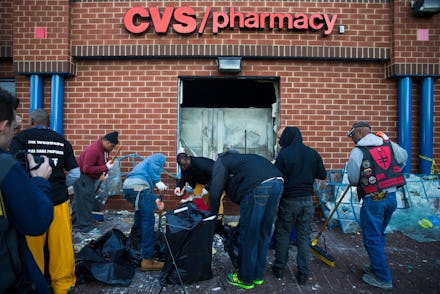6 Photos Show All the "Thugs" Changing Baltimore Right Now

According to Donald Trump, the Mayor of Baltimore, our president and countless individuals on social media, the city of Baltimore is overrun with "thugs."
Many on the internet (Mic included) have been quick to deem the term flippant and inappropriate, asserting that it's rooted in racism and delegitimizes justified anger. Are they right?
Mic looked into the actual response of Baltimore citizens to the riots in their community to determine just how "thuggish" they actually are. Here's the truth about what all the "thugs" in Baltimore are doing right now:
1. Feeding their hungry neighbors
Nearly 13% of Baltimore County residents face "food insecurity," according to Feeding America, and the numbers are higher for children. Eighty-four percent of Baltimore city public school students receive free or reduced-fee meals at school, which complicated the decision to close Baltimore schools on Tuesday.
Luckily, organizations like the Maryland Food Bank and Operation Help or Hush responded to school closures by offering local children free meals. Organizing through the hashtag #BaltimoreLunch, volunteers distributed bagged lunches throughout the city.
2. Caring for local children
Beyond hunger, many Baltimore residents have been concerned with the overall well-being of Baltimore children throughout the recent unrest. Kenneth R. Darden, president and CEO of the Boys & Girls Club of Metropolitan Baltimore, is one of them.
"These are troubling times for our City, but we have to do what we always do, 'put our children first!' Darden wrote on the organization's website, announcing the clubs would remain open during the day so kids would have a place to go during school hours. "We will use our best judgement to ensure that our staff and members remain safe but want the communities and families that we serve to be reassured that we are there for them as always."
3. Supporting local businesses
After seeing some rioters damage local businesses, the founders of the organization Support Baltimore decided to do something to help. Now, they're selling stickers with positive messages about the city, and will devote 100% of the proceeds to helping local businesses.
"Thinking about how we would support ourselves, our families, and still manage to keep our doors open after such an event was what brought us to the idea of starting a site to help the people affected avoid that stress as much as possible," the founders wrote on their website. "We want to help the people who had no control over the situations at hand yet were targeted as scapegoats for the rioters and people looking to release anger."
4. Rebuilding their city's infrastructure
Fires consumed 19 buildings and 144 vehicles during the riots, according to the Wall Street Journal. In addition to the countless individuals who have taken it upon themselves to go into the streets and clean up rioters' debris, several organizations are leading efforts to help. The Baltimore Community Foundation, for example, has begun to raise funds to "repair the physical and emotional damage that has been done and strengthen our community for the future."
Others are forming cross-community coalitions to support the city in its time of need. The Jewish organization The Associated, for example, states on its website that it is now working with local "churches, community centers and civic organizations" to distribute the funds they've raised towards servicing "the neighborhoods affected most deeply by this unrest."
5. Preserving local culture
"Where words fail, music speaks." Hans Christian Andersen's astute words are at the heart of an upcoming benefit concert at Baltimore's Metro Gallery, a performance space, art gallery and bar. The proceeds of the May 20 "Be More Benefit: A Night of Music to Aid the Rebuilding of our City" will be donated to Baltimore Community Foundation's Fund for Rebuilding Baltimore.
6. Thinking about the bigger picture
Baltimore citizens aren't just raising money to address the more superficial damage of recent events. Organizations like the Inner Harbor Project are working to address the root of unrest itself. The organization, according to its website, "identifies teenagers who are leaders among their peers, equips them with research and professional skills, and organizes them to come up with solutions to issues that divide our society on the basis of race, class and culture."
With "thugs" like these working tirelessly to address not only the recent riots but also the systemic issues the Baltimore community has faced for decades, we have every reason to feel optimistic about Baltimore's future. So instead of hurling ignorant epithets, we should be treating these citizens with the respect their actions deserve.